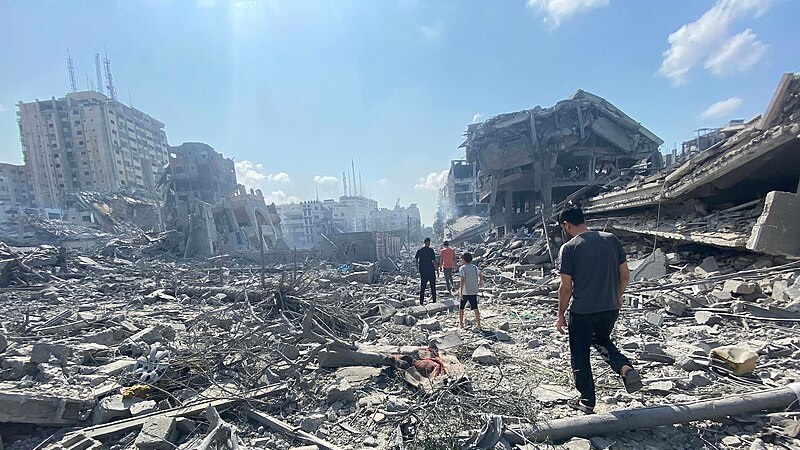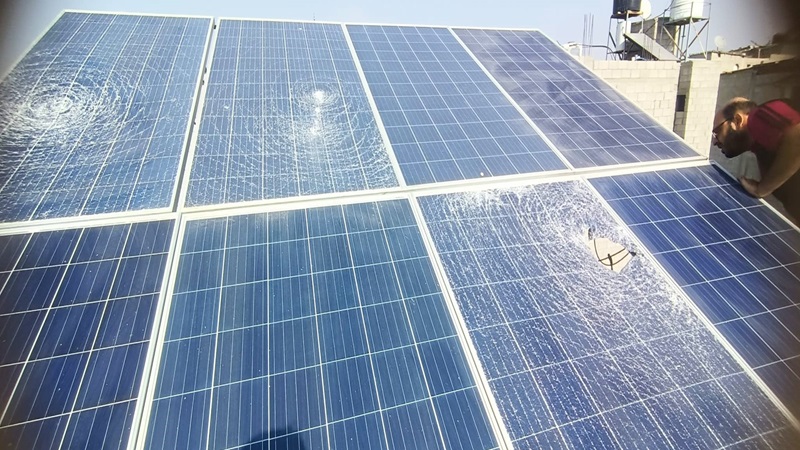As Israel cuts off electricity to the Gaza Strip, rooftop solar panels help residents to survive frequent bombardment
As the Israeli government cuts off fuel supplies to the besieged Palestinian enclave of Gaza, solar panels are providing a lifeline for some of the area’s two million residents.
For years, the region has suffered blackouts which worsen during Israeli attacks and wealthier Gazans have turned to solar panels for reliable electricity.
After Hamas militants invaded Israel on 7 October and massacred over 1,400 civilians, the Israeli defense minister ordered a “complete siege” of Gaza, cutting off electricity and fuel supplies.
Residents of Gaza told Climate Home these solar panels, while still vulnerable to Israeli bombardment, were helping keep the lights on.

Palestinians inspect the damage following an Israeli airstrike on the El-Remal aera in Gaza City on October 9, 2023. (Photo: Naaman Omar apaimages)
Twenty-nine year old Amjad Al-Rais lives in Gaza City, the part of the Gaza Strip which Israeli fighters have attacked the most. He has had solar panels on the roof of his house for five years.
He told Climate Home: “Solar panels are very important to our lives and they are the best option during the current time with the outbreak of war, to produce electricity around the clock without interruption.”
Like many Gazans, Al-Rais had previously relied on fossil fuel generators but said these require a lot of fuel “which is not currently available due to the Israeli blockade”.
Muhammed Al-Yaziji owns a company that sells solar panels in Gaza and said that “there has been a significant demand during the last five years… with the frequent power outages in Gaza”.
Bad in peace, worse in war
For over a decade, Gaza has not had enough electricity to meet its needs, leading to blackouts.
The United Nations says this has “severely affected the availability of essential services, particularly health, water and sanitation services, and undermined Gaza’s fragile economy”.
The electricity that Gazans do have comes partly from a gas-fired power plant and partly from electricity cables from Israel, paid for by the Palestinian authority. Some Gazans supplement this with their own generators or solar panels.
Since Israel cut off supplies, hospitals in Gaza have struggled to provide care to the sick and injured.
🚨 URGENT UPDATE: Doctors in #Gaza have issued an urgent warning that the lives of 130 premature babies are in imminent danger if fuel does not reach hospitals soon.
1/4 pic.twitter.com/JiVFQIdOwJ
— Medical Aid for Palestinians (@MedicalAidPal) October 21, 2023
This sparked protests from humanitarians. The head of Medical Aid for Palestinians, Melanie Ward, said that 130 premature babies were in danger from the hospital’s lack of electricity.
“The world cannot simply look on as these babies are killed by the siege on Gaza… A failure to act is to sentence these babies to death,” she said.
Prior to the recent explosion of violence, the World Bank attempted to
Read More







Never miss a story. Join us on social.